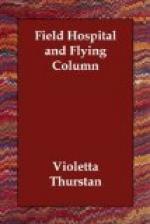Skiernevice is a small town, important chiefly as a railway junction, as two lines branch off here towards Germany and Austria north-west and south-west. The Tsar has a shooting-box here in the midst of beautiful woods, and two rooms had been set apart in this house for our Column.
We arrived late in the evening, secretly hoping that we should get a night in bed, and were rather rejoiced at finding that there were no wounded there at all at present, though a large contingent was expected later. So we camped in the two rooms allotted to us: Princess, Sister G., and myself in one, and all the men of the party in the other. No wounded arrived for two or three days, and we thoroughly enjoyed the rest and, above all, the beautiful woods. How delicious the pines smelt after that horrible Lodz. Twice a day we used to go down the railway line, where there was a restaurant car for the officers; it seemed odd to be eating our meals in the Berlin-Warsaw International Restaurant Car. There was always something interesting going on at the station. One day a regiment from Warsaw had just been detrained there when a German Taube came sailing over the station throwing down grenades. Every man immediately began to fire up in the air, and we ran much more risk of being killed by a Russian bullet than by the German Taube. It was like being in the middle of a battle, and I much regretted I had not my camera with me. Another day all the debris of a battlefield had been picked up and was lying in piles in the station waiting to be sent off to Warsaw. There were truck-loads of stuff; German and Russian overcoats, boots, rifles, water-bottles, caps, swords, and helmets and all sorts of miscellaneous kit.
We often saw gangs of prisoners, mostly Austrian, but some German, and they always seemed well treated by the Russians. The Austrian prisoners nearly always looked very miserable, cold, hungry, and worn out. Once we saw a spy being put into the train to go to Warsaw, I suppose to be shot—an old Jewish man with white hair in a long, black gaberdine, strips of coloured paper still in his hand with which he had been caught signalling to the Germans. How angry the soldiers were with him—one gave him a great punch in the back, another kicked him up into the train, and a soldier on the platform who saw what was happening ran as fast as he could and was just in time to give him a parting hit on the shoulder. The old man did not cry out or attempt to retaliate, but his face was ashy-white with terror, and one of his hands was dripping with blood. It was a very horrible sight and haunted me all the rest of the day. It was quite right that he should be shot as a spy, but the unnecessary cruelty first sickened me.




